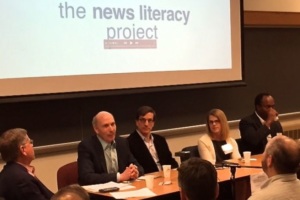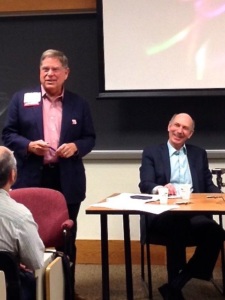News literacy seminar at Wesleyan University: Giving truth a fighting chance
 d overflow crowd on Saturday during Wesleyan University’s 2016 reunion and commencement weekend.
d overflow crowd on Saturday during Wesleyan University’s 2016 reunion and commencement weekend.“News literacy is giving truth, or facts, a fighting chance to catch up with falsehoods — or at least not be overwhelmed by them in today’s media-saturated world,” said Alan C. Miller, founder and president of the News Literacy Project (NLP) and a 1976 Wesleyan graduate. “It is teaching that all information is not created equal.”
Miller produced the timely panel as a special WESEMINAR. He was joined by Ethan Bronner ’76, a senior editor at Bloomberg News and a former editor and reporter at The New York Times; Erika Franklin Fowler, an assistant professor of government at Wesleyan who co-directs the Wesleyan Media Project, which tracks and analyzes political ads aired on broadcast television in real time during elections; and Rob King ’84, ESPN’s senior vice president for SportsCenter and news and an NLP board member.
The session was moderated by Alberto Ibargüen ’66, president of the John S. and James L. Knight Foundation, which was instrumental in launching the news literacy movement nationally and was NLP’s initial funder.
“This is a world that relies on personal consumption,” King said. “We have to cater to audiences who are constantly plugged in to their phones. Our job, then, becomes that much more complicated — but also that much more important. You have to get past the wall of emotion an d introduce facts to what people consume.”
d introduce facts to what people consume.”
Miller shared a short video introducing NLP’s cutting-edge Checkology™ virtual classroom that was launched May 2 and is the project’s primary path to national scale and sustainability.
“News literacy is so profoundly important, and this project is amazing,” Fowler said of NLP.
Bronner, who covered education issues while at the Times, described the NLP’s new platform as “pretty fabulous” and “very well done.”
Joseph Kahn ’86, a leading scholar on civic education from Mills College and the chair of the MacArthur Research Network on Youth & Participatory Politics, said that research shows that more education does not decrease an individual’s proclivity to view only information with which they agree as fair and accurate. In fact, he said, erudition increases this tendency.
On the other hand, Kahn said, those who have been exposed to news literacy will show “a major decline” in their refusal to be swayed by factual information that runs contrary to their personal beliefs.